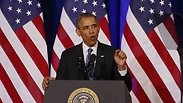
Obama promises not to monitor heads of states, governments of friends and allies
After massive diplomatic debacle, Obama announces massive rehaul of NSA, promises not to 'monitor communications of heads of state and government of our close friends and allies.' In bid to rebuild trust, he 'instructed national security team to work with foreign counterparts to deepen coordination and cooperation'
President Barack Obama is calling for ending the government's control of phone data from hundreds of millions of Americans, and he promises that "we will not monitor the communications of heads of state and government of our close friends and allies."
The president said Friday he will end the program "as it currently exists."
Documents leaked by former US National Security Agency contractor Edward Snowden showed the NSA and its British counterpart GCHQ had in 2009 targeted an email address listed as belonging to then-Israeli Prime Minister Ehud Olmert and monitored emails of senior defense officials.
Reports also said that spy organizations rented an apartment next to then Defense Minister Ehud Barak to eavesdrop on his calls.
At the time Prime Minister Benjamin Netanyahu did not elaborate on whether Israel intended to ask Washington for clarifications, but did say that "In the close ties between Israel and the United States, there are things that must not be done and that are not acceptable to us."
In his Friday announcement Obama called for extending some privacy protections to foreign citizens whose communications are scooped up by the US. The moves are more sweeping than many US officials had been anticipating.
"The leaders of our close friends and allies deserve to know that if I want to learn what they think about an issue, I will pick up the phone and call them, rather than turning to surveillance," Obama said.
Related stories:
- Report: Snowden has more US-Israel secrets to expose
- PM: US spying on Israel unacceptable
- Report: NSA spied on Israel
The step was designed to smooth over frayed relations between, for example, the United States and Germany after reports surfaced last year that the NSA had monitored the mobile phone of German Chancellor Angela Merkel. Brazilian President Dilma Rousseff postponed a state visit to Washington to protest US tactics.
Obama's highly anticipated speech, after months of revelations about US spying by former National Security Agency analyst Edward Snowden, said intelligence officials have not intentionally abused the program to invade privacy.
But Obama also said he believes critics of the program have been right to argue that without proper safeguards, the collection could be used to obtain more information about Americans' private lives and open the door to more intrusive programs.
Obama said the US had a "special obligation" to re-examine its intelligence capabilities because of the potential for trampling on civil liberties.
He also sought to reassure allies and others overseas.
"The bottom line is that people around the world - regardless of their nationality - should know that the United States is not spying on ordinary people who don't threaten our national security, and that we take their privacy concerns into account. This applies to foreign leaders as well," he said.
He added, "The leaders of our close friends and allies deserve to know that if I want to learn what they think about an issue, I will pick up the phone and call them, rather than turning to surveillance.
"And I've instructed my national security team, as well as the intelligence community, to work with foreign counterparts to deepen our coordination and cooperation in ways that rebuild trust going forward."
Obama further said that "the United States has unique responsibilities when it comes to intelligence collection. Our capabilities help protect not only our own nation, but our friends and allies as well. In other words, just as we balance security and privacy at home, our global leadership demands that we balance our security requirements against our need to maintain trust and cooperation among people and leaders around the world."
The leaks from Snowden, a fugitive now living in Russia, included revelations the US was monitoring the phone of German Chancellor Angela Merkel, sparking intense anger in Europe.
Obama mentioned "Mr. Snowden" by name and said the "sensational" revelations of classified spying programs could impact U.S. operations for years to come.
While the president has said he welcomed the review of the nation's sweeping surveillance programs, it's all but certain the study would not have happened without the leaks.
Obama warned, however, that "we cannot unilaterally disarm our intelligence agencies." He added, "We know that the intelligence services of other countries - including some who feign surprise over the Snowden disclosures - are constantly probing our government and private sector networks."
But he said the U.S. must be held to a higher standard. "No one expects China to have an open debate about their surveillance programs, or Russia to take the privacy concerns of citizens into account," he said.
Key questions about the future of the surveillance apparatus remain. While Obama wants to strip the NSA of its ability to store the phone records, he offered no recommendation for where the data should be moved. Instead, he gave the intelligence community and the attorney general 60 days to study options.
Privacy advocates say moving the data outside the government's control could minimize the risk of unauthorized or overly broad searches by the NSA.
The changes are expected to be met with criticism from some in the intelligence community, who have been pressing Obama to keep the surveillance programs largely intact.
Snowden faces espionage charges in the US but is currently living in Russia, where he was granted temporary asylum. Some privacy advocates have pressed Obama to grant him amnesty or a plea deal if he returns to the US, but the White House has so far dismissed those ideas.















